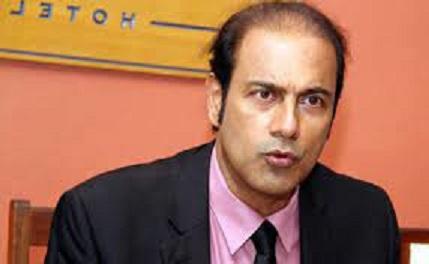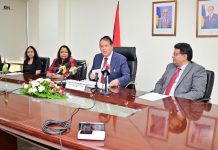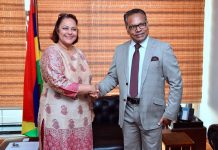Africa-Press – Mauritius. It is easy to identify the dysfunctions of political parties in Mauritius or elsewhere. But citizens are no longer scrambling to renew political structures or participate in debates with a view to developing new practices in the political environment.
Steven Obeegadoo, a long-time political activist, shares his initiatives to promote the renewal of ideas and gives his impressions of the importance of collective intelligence in the 21st century.
* It is true that everything that is “swung” before the Commission of Inquiry on Drugs currently concerns so far only allegations, and the lawyers and police officers whose names have been cited benefit from the presumption of innocence .
But have you wondered what impact such allegations will have on Mauritians and young people in particular? It is obvious that everything reported by the media adds to the feeling of fed up of Mauritians and amplifies the perception that everything is rotten.
Obviously, this is a very serious situation for the institutions of the State, such as the Police and the penitentiary services, as for the bar whose integrity is questioned.
Equally concerning is the sense that I have noted among some that the mere fact of being represented by a lawyer indicates the guilt of a defendant and that the lawyer serves to deflect police investigations. We must denounce, sanction any deviation, reform and regulate. But it is also essential to remind everyone what a “rule of law” means.
And young people must be taught that the presumption of innocence is a principle expressed by Article 11 of the United Nations Declaration of Universal Rights and that access to a lawyer is a fundamental right enshrined in Chapter II of our Constitution.
Paradoxically, what is happening should strengthen confidence in our democracy because it is a Commission of Inquiry, instituted by the State, chaired by a former judge of the Supreme Court, which brings to light certain troubling facts.
It is therefore fortunate that Justice is still perceived by the greatest number as the last bastion against arbitrariness, abuse and racketeering of all kinds.
You see, we must find the right balance between the imperative of denouncing excesses and that of sanctioning the culprits without calling into question democratic rights and the principles of the rule of law.
I insist on the fact that it is essential that any defendant, whoever he is and whatever the offense with which he is accused, has the right to be heard and to defend himself, that he has the possibility of have access to justice, and that lawyers, while complying with their code of ethics, can do their job according to their conscience. This is also democracy and good governance.
* It is not clear at this stage how things will develop at the level of the Commission of Inquiry, but it is already clear that the allegations and other revelations about the drug trafficking-politics links will further weaken the government alliance – albeit the affair of the “Amsterdam Boys” in 1985 did not chase the then MSM government from power… What do you think?
Without prejudging the continuation of the work of the Commission and its possible conclusions, insofar as relatives of any political party are the subject of serious accusations, it can be estimated that this will have unfavorable political repercussions for this party.
However, it is premature to predict the precise legal and political consequences. Anyway, given the parliamentary majority enjoyed by the MSM-ML, I find it difficult to see this affair having a direct impact on the government mandate.
The debate is elsewhere. The various allegations and revelations are a wake-up call for civil society, which must demand specific measures from our governments to put an end to an unhealthy situation.
François Mitterrand said that “freedom and democracy require a permanent effort. It is impossible for those who love them to fall asleep. ” * We are no longer in the days of the suitcases of parliamentarians coming from Amsterdam.
Today, we talk about the “unsolicited visits” of lawyers, some of whom operate in the political fold, to certain drug traffickers who are serving prison sentences.
In both cases, there would also be the involvement of politicians or those close to power in this scourge of drug trafficking. Does politics push some people to believe they are all-powerful and untouchable?
The standards of good governance and the democratic culture have meant that the functioning of the political world has evolved considerably. The practices of yesteryear with regard to recruitment, influence peddling and deviant individual behavior are less and less accepted by public opinion or tolerated by the law.
Ministers, MPs and other politicians who remain out of phase act at their peril. Not only are our people more educated, but technology has created a new environment of transparency and accountability.
I am referring to the role of private radio stations, to the instantaneous television broadcasting of parliamentary sessions and, more generally, to the Internet, which has given a whole new meaning to the circulation of information.
End the culture of impunity! Democracy is advancing rapidly. But civil society and intellectuals need to become more involved in the public debate. When the clamor has died down around the Commission of Inquiry and its conclusions are known, lessons will have to be learned.
Beyond prosecutions and exemplary sanctions against those who have transgressed the law, it will be necessary to act to clean up and prevent. The Commission’s report will be an opportunity to act.
It is obvious that with regard to drug trafficking, certain practices within the Police and in particular the ADSU will have to be reviewed. It is unimaginable that the penitentiary services do not question certain practices after what we have heard.
I suggested this to the Bar Council: when the Commission has delivered its conclusions, that lawyers be called upon to work together to make the appropriate changes to our Code of Ethics and make the necessary recommendations to the authorities.
Moreover, there is an urgent need to establish a regulatory framework with regard to the financing of political parties and to look into electoral expenditure.
* Ivan Collendavelloo said during an “Eid Ul-Fitr Dinner” this week that we should not make political recovery on a file as important as drug trafficking and the fight led by the current Government.
But questions arise, however, about the “filtering” of all those who try to rub shoulders with the political world or even who manage despite everything to infiltrate the political apparatus and that of the State?
In Mauritius, as elsewhere, those who do not respect the law seek by all means to curry favor with the powerful. As for the politicians themselves, the temptations of abuse of power, influence peddling and corruption constantly await them.
But the public is no longer fooled and the requirements are changing rapidly. François Fillon learned this the hard way during the French presidential elections and the former Israeli Prime Minister, Ehud Olmert, had the opportunity to reflect on it in prison, among other things.
The examples are legion. To guard against this requires the vigilance of parties, democratic structures, and rules of conduct and regulation of internal life as expressed in party statutes.
Thus it is important to have a well-defined framework to ensure democratic functioning and transparency, that is to say a Constitution. Filtering cannot be left to the goodwill of individuals or leaders depending on events. This also applies to the State, hence the need for a code of conduct for ministers and deputies, which, in practice, is sorely lacking in Mauritius.
Moreover, the electoral mores with all an outdated folklore and unnecessary expenses as evidenced by the “bases” on every street corner and the parades of cars, must be reviewed and the code of conduct proposed by the Electoral Commission must be endowed with a force of law.
And education for democracy? We are not born imbued with a political culture. Democracy, the rights and responsibilities of citizens and the principles of good governance are discussed and learned.
It is necessary to ensure that young people are imbued with a democratic culture, but the Mauritian School does not care much about it and the Citizenship Education that I introduced from the primary cycle disappeared from the educational circuit for a long time.
* We may think that we must replace bad politicians with good politicians in order to bring about positive changes in our society, in good governance, but how to achieve this with parties that remain blocked and all-powerful leaders that we say cut off from the political and social realities of the country?
In a democracy based on political pluralism, it is essential that parties are open to civil society and that the functioning of the party reflects the type of society it wishes to promote.
How to take seriously the promises of good governance and respect for democracy within a government if even within a party there is a single thought and a monarchical functioning?
However, three of our four main parties have leaders whose father was leader before them! How can we be surprised that dynastic practices do not agree with democratic functioning?
If leadership is transmitted according to the surname, can we distinguish between family property and party property, when one owns an imposing building in the heart of Port Louis? Or can one distinguish between personal wealth and party war chests, especially if they are confined to safe deposit boxes or deposited in personal bank accounts?
Another phenomenon that challenges: with the decline of ideologies and in the absence of internal debates around the political project of the respective parties, their internal life boils down to positioning and fierce competition to obtain the nomination in the elections and possibly a morocco ministerial.
From then on, the party becomes “enn basket crabs”. The authorities, becoming yes-no assemblies, do not dare to challenge the leader. On the contrary, they seek to confirm all his intuitions and favor the realization of all his whims. How can we be surprised when leaders are cut off from public life?
Already in the last century, the Italian sociologist Roberto Michels dissected the functioning of the German Social Democratic Party (SPD), to demonstrate the reign of the oligarchy of permanent officials and leaders concerned only with the preservation of their privileges. Restoring confidence in politics and deepening democracy necessarily involves the democratization and modernization of all parties.
If a political party remains, within modern democracies, the organizational form for the fight of ideas, structuring the political offer and carrying the promise of alternation, a major stake for the future of our society and of any system of political pluralism is the permeability of the political party with regard to the currents of opinion that run through and shape society.
* The constitutional reform project of the country’s two major parties – the MMM and the PTr – is struggling to materialize; that of the MMM chaired by you at the head of a task force saw many of its proposals – and not the least important – being rejected by the political bureau of the party.
Moreover, it is still not known what happened to the PTr reform project. What are you saying to yourself today? That it was a lure to calm things down and silence the protest after December 2014?
You are right not to mention MSM or PMSD because we have never heard of statuses in their case. As for the PTr, it is the most total opacity, because its Constitution is neither accessible nor known. It is true that its revision was discussed and entrusted to a committee after the debacle of 2014 but nothing has been heard since.
The PTr gives the impression of being a party whose governing bodies meet according to the sole will of the leader, and the Constituency Labor Parties (regional committees) according to the moods of local leaders.
The MMM, on the other hand, has an intense internal life with a Political Bureau meeting every week, a Central Committee bringing together nearly a hundred people, most of whom are democratically appointed, meeting every fortnight,
as well as the regional committees comprising the most active militants at the level of the constituencies (the regional committees of the MSM also meet once a month).
MMM’s challenges relate to how to ensure the day-to-day democratic functioning and entrenchment of the party in a society that is increasingly wary of politics.
Then, it is a question of renewing itself on the organizational and ideological level, to return to the formidable war machine of the past. Finally, the objective, after a series of defeats since 2003, is to win.
. Reinvent yourself to win and win to transform Mauritian society. This is the challenge for the MMM as for many left-wing parties, socialists or social democrats, from India to Europe, from Brazil to Australia.
The Task Force that I chaired has thus proposed a new Constitution, the result of patient work listening to activists and an in-depth study of what is best done within the parties of the democratic left through world.
We wanted to provoke a ‘Big Bang’ allowing the MMM to demonstrate that there could be another way of doing politics: Ecosocialism, openness to civil society, direct internal democracy, gender parity, youth quotas, financial transparency …
Some of our proposals have been accepted, but the most avant-garde ideas will await the next constitutional revision. Anyway, the most important thing is the implementation of the new Constitution because there are many advances.
For example, the MMM undertakes combat discrimination based on sexual orientation; achieve gender parity by 2030; to oppose any communal categorization in the Constitution.
Moreover, the MMM has adopted a Code of Conduct defining the rights and duties of activists, providing for suspension in the event of a judicial conviction for an offense going against the principles of the party.
The by-election of Quatre Bornes could complicate things, because it would become the priority. However, that the party can reinvent itself to inspire and mobilize young people of age and spirit is the sine qua non of victory in Quatre Bornes and beyond.
* Advocating democracy within and in the functioning of political formations is undoubtedly necessary, but have you wondered if the militants would be ready to support another leader of the party in place of Paul Bérenger?
I have always refused to make the imperative of renewal a question of people. Paul Bérenger is a key figure in the MMM. What matters is that the MMM can once again strike the imagination and arouse enthusiasm.
We are progressing on the ground and the disappointments of the so-called Alliance Lepep are gradually coming back to us. I choose to be positive. We need to ensure the implementation of the new Constitution and further democratize the party.
We must reaffirm our principles of Mauritianism and social justice; recruit; rethink our strategy of conquest of power, open up to society and dialogue with the living forces,
develop a government project through participatory debates. The MMM is full of talent that needs to be showcased. Many executives are not deputies and do not always have the opportunity to make themselves known to the general public.
Do you know that our Central Committee has recently had more than a third of women and that the Militant Youth has just democratically chosen a new National Executive?
* In any case, the choice of the MMM candidate for the partial at no. 18 and the non-appointment of Vijay Makhan are considered by political analysts as another calculation by Paul Bérenger in order to facilitate a victory for Arvin Boolell, this with the objective of eventually eliminating the leadership of Navin Ramgoolam at the head of the PTr.
Did that surprise you? The by-election sparked vigorous debate for weeks. Should we participate in the partial? If so, when should we choose our candidate? And who would that candidate be?
Our last Central Committee meeting lasted twice as long as usual. Like others, I gave my opinion. On the recommendation of the leadership, the party finalized its choice and the candidacy of Nita Jaddoo was made public. The stakes in this election are very high.
The result of the ballot will provide a snapshot of public opinion in a fairly representative constituency of the country and it will undoubtedly determine the orientations and strategies of each other for the next elections.
Paul Bérenger insisted that we are there to win and all activists will have to fully commit to having our candidate elected. * Let’s skip over the political calculations of party leaders.
It is said that it is politics that almost always acts as a vector of change, and change will pass through the renewal of political personnel. However, if the system and the political apparatus remain blocked, how can the future be envisaged under these conditions?
We spend too much time on day-to-day governance issues. Often, when we read the newspapers and listen to the radio, the public debate boils down to abuse of power, politics and crime.
I hope that 2018 will be an opportunity to take stock of 50 years of our independence, and to address fundamental issues for the future such as the unity of the Mauritian people against the backdrop of the 1968 Constitution.
and the electoral system inherited from colonialism, the economic development strategy in the light of a constantly changing globalization, the challenges of social and economic democratization, the means of social solidarity, our ecological future and the energy transition, the prospects for better living by relying on new technologies, the necessary adaptation to the aging of the population, the state of emergency of public health in the face of the progression of non-communicable diseases in Mauritius, Education for the 21st century …
So many sites to titillate the Mauritian genius. I call on intellectuals and civil society to challenge politicians and redirect public debate. And, taking stock of the challenges facing us, would it be utopian to imagine a common effort by progressives, free of any responsibility for the past? Because there is clearly an urgent need to invent the new left which would turn its back on the political practices of another time in order to make social justice, ecology, Mauritianism and integral democratization the founding principles of an innovative project for a other Mauritius
For More News And Analysis About Mauritius Follow Africa-Press







